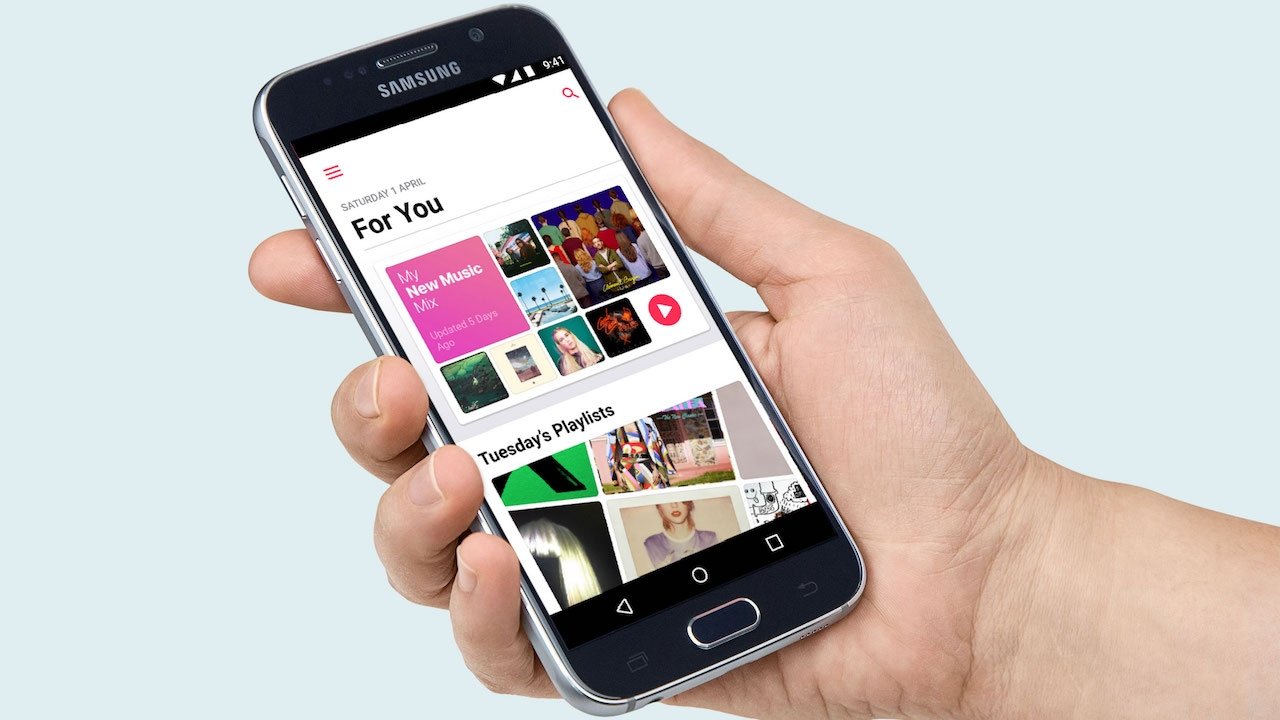Apple Music for Android beta hints at lossless quality streaming
Code within the latest beta version of Apple Music for Android corroborates rumors that lossless streaming might be coming soon to the platform.

Credit: TechCrunch
A report from earlier in May suggested that a high-fidelity streaming option was in the works for Apple Music. The option is rumored to provide higher-quality audio streaming to users who pay an extra monthly fee.
Although it isn't clear when such a feature would launch, the Apple Music for Android 3.6.0 beta contains code strings that confirm the existence of a HiFi option. The code was first uncovered by 9to5Google.
One string tells users that "Lossless audio files preserve every detail of the original file. Turning this on will consume significantly more data."
Another piece of code warns Apple Music users that lossless audio files will take up more space on a user's device. For example, Apple says that users could store 1,000 songs with lossless quality, instead of 3,000 songs at "high quality."
There also appears to be a similar warning about data. In the code, Apple is warning that a three-minute song takes about 1.5 MB of data with high effiency, 6MB with high quality at 256 kbps, 36 MB with lossless at 24-bit/48 kHz, and 145MB with hi-res lossless.
"Support varies and depends on song availability, network conditions, and connected speaker or headphone capability," the code also reads.
Based on the code strings, it seems like Apple is planning on offering two varieties of "HiFi" audio: standard lossless and high-resolution lossless. It appears that the former will offer up to 48kHz, while the latter will offer up to 192kHz.
Apple would be fairly late to launching a high-fidelity streaming option when compared to other music platforms. Amazon launched a lossless audio planw back in 2019, while Spotify announced its own HiFi offering back in February 2021. Other services include Tidal, which debuted with high-fidelity streaming but has struggled to gain a foothold. Financial technology company Square acquired Tidal in March.
A separate rumor on Friday claimed that the "Apple Music HiFi" service could launch in May.
Stay on top of all Apple news right from your HomePod. Say, "Hey, Siri, play AppleInsider," and you'll get latest AppleInsider Podcast. Or ask your HomePod mini for "AppleInsider Daily" instead and you'll hear a fast update direct from our news team. And, if you're interested in Apple-centric home automation, say "Hey, Siri, play HomeKit Insider," and you'll be listening to our newest specialized podcast in moments.

Credit: TechCrunch
A report from earlier in May suggested that a high-fidelity streaming option was in the works for Apple Music. The option is rumored to provide higher-quality audio streaming to users who pay an extra monthly fee.
Although it isn't clear when such a feature would launch, the Apple Music for Android 3.6.0 beta contains code strings that confirm the existence of a HiFi option. The code was first uncovered by 9to5Google.
One string tells users that "Lossless audio files preserve every detail of the original file. Turning this on will consume significantly more data."
Another piece of code warns Apple Music users that lossless audio files will take up more space on a user's device. For example, Apple says that users could store 1,000 songs with lossless quality, instead of 3,000 songs at "high quality."
There also appears to be a similar warning about data. In the code, Apple is warning that a three-minute song takes about 1.5 MB of data with high effiency, 6MB with high quality at 256 kbps, 36 MB with lossless at 24-bit/48 kHz, and 145MB with hi-res lossless.
"Support varies and depends on song availability, network conditions, and connected speaker or headphone capability," the code also reads.
Based on the code strings, it seems like Apple is planning on offering two varieties of "HiFi" audio: standard lossless and high-resolution lossless. It appears that the former will offer up to 48kHz, while the latter will offer up to 192kHz.
Apple would be fairly late to launching a high-fidelity streaming option when compared to other music platforms. Amazon launched a lossless audio planw back in 2019, while Spotify announced its own HiFi offering back in February 2021. Other services include Tidal, which debuted with high-fidelity streaming but has struggled to gain a foothold. Financial technology company Square acquired Tidal in March.
A separate rumor on Friday claimed that the "Apple Music HiFi" service could launch in May.
Stay on top of all Apple news right from your HomePod. Say, "Hey, Siri, play AppleInsider," and you'll get latest AppleInsider Podcast. Or ask your HomePod mini for "AppleInsider Daily" instead and you'll hear a fast update direct from our news team. And, if you're interested in Apple-centric home automation, say "Hey, Siri, play HomeKit Insider," and you'll be listening to our newest specialized podcast in moments.

Comments
Additionally, nobody needs more than 44.1 kHz. The only reason 48 kHz is relatively common is film, where it gives you a nice, round number of samples per video frame. Unless you are literally making music for cats, 192 kHz sample rate in a final record is profoundly wasteful.
I wouldn't be surprised if Apple does this, but it would be very anti-environment. Consumes 24 times the data for audio which is indistinguishable. More storage consumption on the servers (which means 24 times as many servers to store the same number of songs one stores today, 24x the network traffic, more computing on the client.
If Apple offers higher quality music for those who want it, good. Those who don't want to avail themselves don't have to do so. People who desire lossless are a small niche audience. The "logical conclusion" arguments don't really work because the group isn't really large enough to make a profound impact.
This isn't just pointless, though. It's also extremely wasteful. They may as well announce that they accept cryptocurrencies.
TWENTY
FOUR
TIMES
If that isn't extreme, what is?